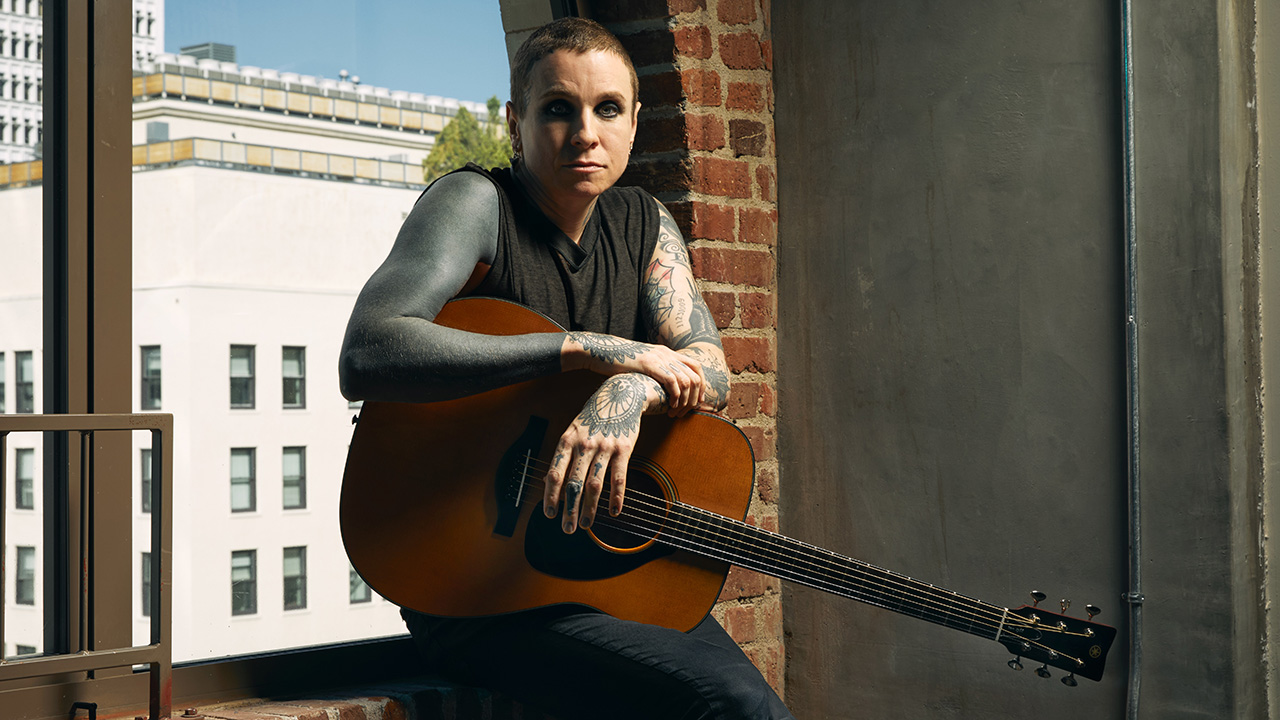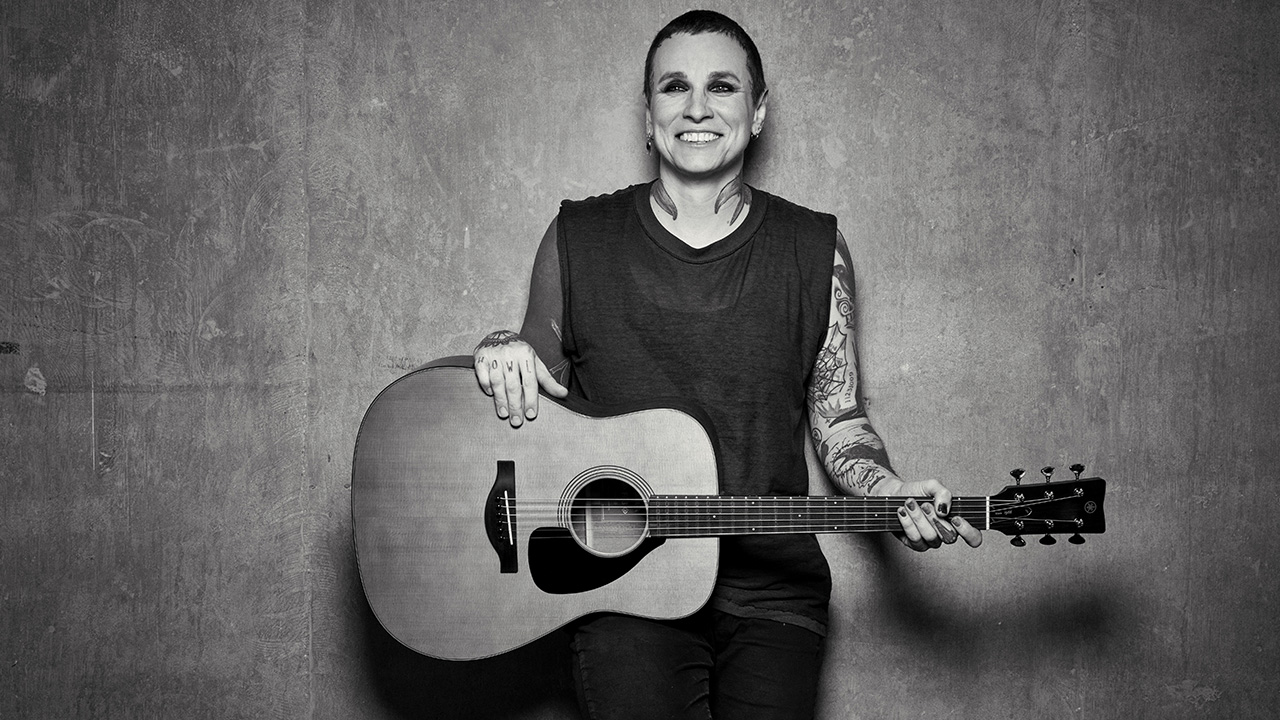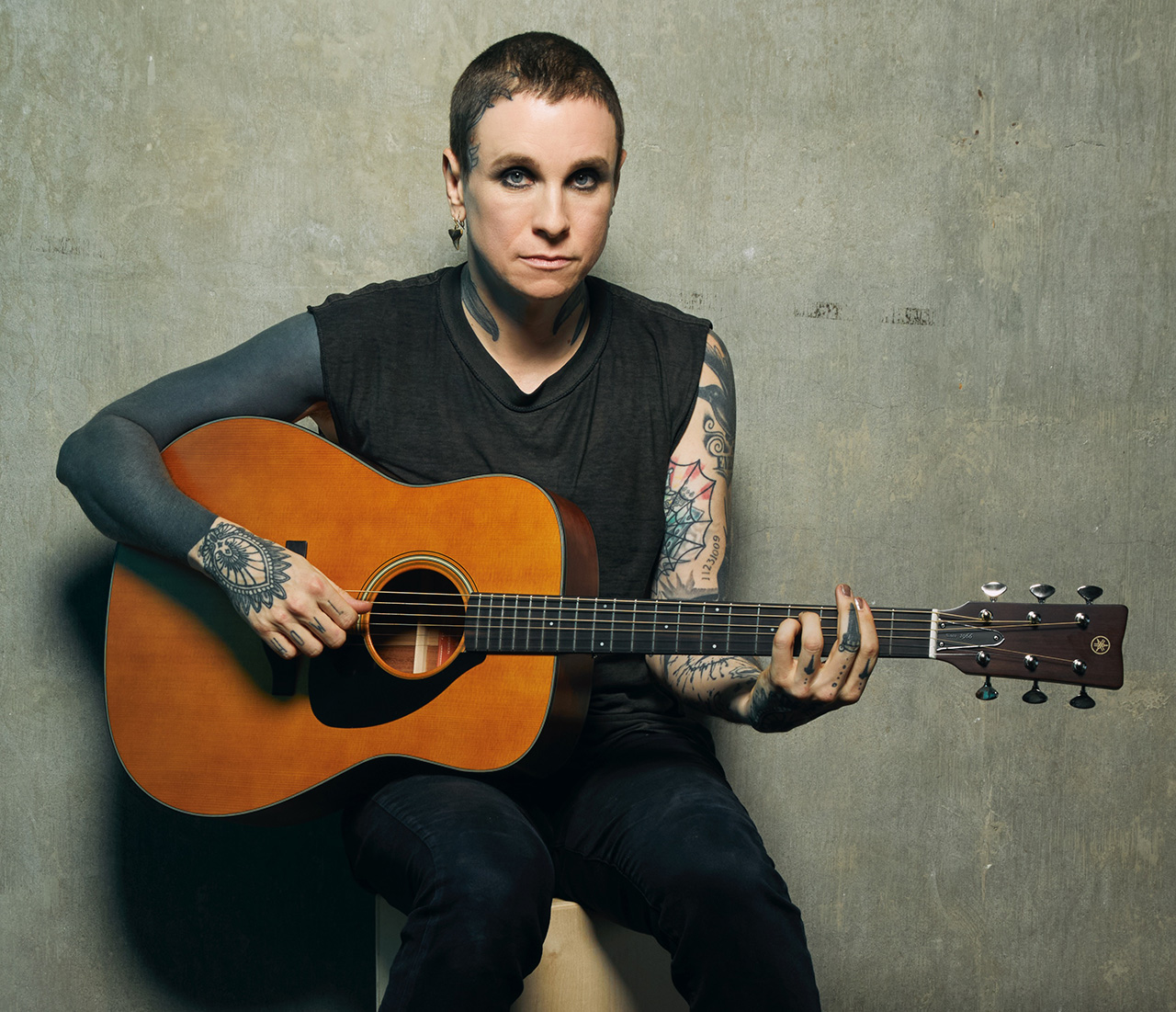
Laura Jane Grace’s smile and humor are as infectious as the blistering yet catchy rage inherent in her music with Against Me! and across a trio of outstanding solo records.
The latest of those, Hole in My Head, offers equal servings of raw and rowdy punk mashed up with laconic folk. Anyone who’s settled in Transgender Dysphoria Blues (2014), Shape Shift with Me (2016), Bought to Rot (2018) or Stay Alive (2020) knows what to expect.
But they probably don’t know that Grace is a full-on guitar junkie. “My love for the instrument has never changed,” she tells Guitar World. “That’s demonstrated by the number of guitars all over my living room as we speak. There’s like four open cases and several others in boxes, along with six acoustics lying on couches and chairs in here.”
Six-string addiction aside, Grace uses her guitars to increase the depth of emotion she covers across Hole in My Head’s 11 tracks. “Coming out of a global pandemic, everything is shaken up and new,” she says. “Then, the songs are going to be about figuring out what you took for granted, and who you now are in this brave new world.
“Whatever I’m going through reveals itself in the songs. I don’t want to be conscious of that; it’s for others to pick up on. I want to create art without justification. There’s always selfishness because this is like a coping mechanism; it’s how I’ve survived. But I also want to connect with people because it makes us feel less alone.”
Since the release of Against Me! Is Reinventing Axl Rose in 2002, Grace has been a beacon of strength, positivity, perseverance and honesty through song. She’s undoubtedly taken on damage – but she’s alright with that, and judging by Hole in My Head, she’s still got a fire under her.
Asked what lies ahead, she says: “Getting out on the road. And in December, I recorded a six-song EP that’ll be out this year. I also did a lot of tracking of songs this past month that I can’t necessarily get into, but there’s a lot of excitement. Who fucking knows? The sky is the limit.”
When did you start to put ideas together for Hole in My Head?
“The genesis was circumstantial, and the circumstance was that everyone in the world was coming out of a pandemic. I was starting over, just like everyone else. I was splitting time between Chicago and St. Louis, and I got to know the St. Louis community and the city.
“This was kind of written on the road when the world opened back up. I recorded the record in a studio called Native Sound, above a bar called The Whiskey Ring on Cherokee Street.”
Through that process, did themes become apparent that separate Hole in My Head from your previous records?
I don't sit down after I record and think, ‘How is this one different from the last one emotionally?’
“Questions like that are hard because – and I’m not trying to be combative – but it’s like, I don’t give a shit! I don't sit down after I record and think, ‘Well, gee, how is this one different from the last one emotionally?’
“It’s just a continuation. Each record is particular to a period in my life, just because of how it works with how you can record and release a record. I’ve always used songwriting as an escape, therapy, or cathartic release from everyday life’s stresses.”
What’s your songwriting process like?
“I wish it were an exact science, but it’s not. I usually defer to working on lyrics first, though. My logic is all the chord structures have already been played, and all the chord patterns have been written. You're not going to reinvent the wheel. And that’s why I love studying other people’s songs; I’ll go through periods where I learn new songs, and the emotion and passion that makes them unique come out.”
Is it different with lyrics?
“I’ve always thought about words in that there’s an infinite combination of syllables, consonants and vowels that you can come up with. By stringing words together and then applying the chord patterns that exist, it’s kind of like building a house where you can build the room, like the shape of the room – meaning the chord pattern – and then you set up the furniture – meaning the words – however you like, and then build around that. But I’d rather set up the furniture and then build the room.”

What guitars have you been leaning on through that process?
“For the last few years I’ve had this Yamaha LJ16 acoustic as my main guitar. It’s been what I’ve been using live and it’s all over this record. What I love about it is it stays in tune.
”When it comes down to it, all I fucking care about when I play is if a guitar stays in tune and if I break strings – especially when playing solo. If I break a string it’s like, ‘Holy fuck!’ because the seconds feel like hours when you’re trying to rectify that problem.”
And how about on the electric side of things?
“I used my ‘64 Fender Jaguar, a Gretsch hollow-body that I forgot the name of, and my Rickenbacker 370/12. And I used my Rickenbacker TR75 amp and my Fender Twin Reverb from the ‘70s. I’ve used that Twin Reverb on every single Against Me! record and all my solo albums.
“And while we’re talking guitars – for Christmas my wife got me a vintage Silvertone Espanada that I am in love with. I’m really fucking excited about it. It’s going to be my main stage guitar going forward.”
I think some assume you work with a typical and simple punk rock setup.
“Even when I started with Against Me!, I was mainly using an acoustic. And the parts of the punk that influenced me are the things that blur the lines between punk and hippie stuff. But I consider the acoustic guitar the most punk rock instrument because it’s the most independent. You don’t even need a fucking amplifier!”
Do you prefer acoustic guitars over electric?
“I’ve always preferred the feel of an acoustic guitar because I like the feeling of it resonating through the guitar’s body when it’s against my body. When you’re playing a solo, an acoustic guitar becomes like a percussion instrument, whereas an electric doesn’t; it’s a hollow body or semi-hollow body, and you can strike a balance.
“I’ve always used and loved Rickenbackers because even unplugged, it has more sound than your average electric guitar.”

Which tracks from Hole in My Head best represent you?
“What would be most representative of me as an artist would be to be combative and not pick a single track! It’s hard because the record should tell a story rather than one song. I look at them like my children – how could I pick a favorite child?
“But Birds Talk Too has a riff that I love, and I like playing it. It’s fun and challenging. And the title track, Hole in My Head, is like a mission statement.”
My left shoulder is fucked up for life from playing guitar… ‘The lighter the guitar, the better’ is the motto as I get older
Can you separate the guitarist you are today from the one you were in the past?
“What hasn’t changed is that I still feel eager to get better, like when I first started playing. I still feel that drive of, ‘If I spend a little more time practicing scales, maybe I’ll become better at ripping it up and soloing.’ I still want to improve.”
And what has changed?
“I may have a little bit of hearing loss! And I’ll tell you what: my left shoulder is fucked up for life from playing guitar. When I see people playing Les Pauls I’m like, ‘Fuck, that thing weighs a fucking ton and would kill my back!’ ‘The lighter the guitar, the better’ is the motto as I get older.”
When it comes to guitars in punk, some only accept the idea of a Johnny Ramone-type hammering away at three chords on an electric. What’s your prescription for good punk rock guitar?
“I’m full of contradictions because passion and spontaneity are important, and nothing should be premeditated. But at the same time I’m very much like, ‘Fucking be in tune!’
“Both sides exist inside me, but technique matters to me. Fingering the frets right matters to me. But spontaneity – and fun aspects where there’s no rules – matter too. So to me, there are no rules; but also… be in tune!”
- Hole In My Head is released on February 16th, and it’s available for pre-order now.







